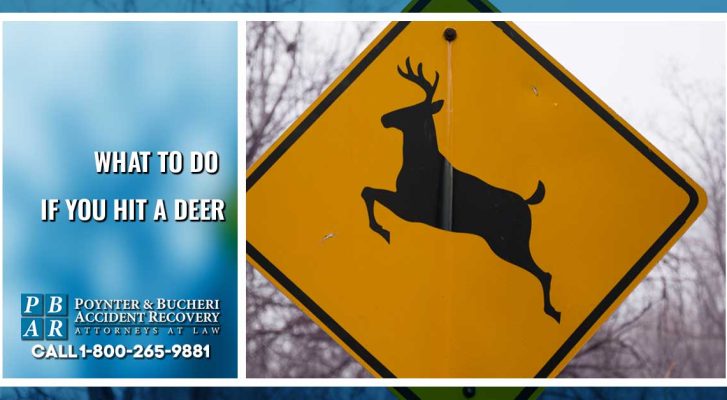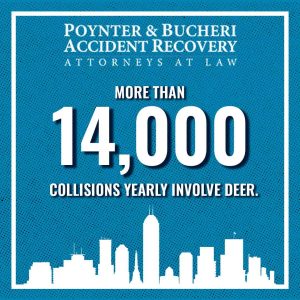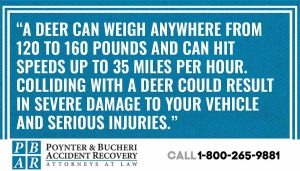
What to Do if You Hit a Deer


Collisions involving wildlife happen more often than you might think. According to Indiana’s Division of Fish and Wildlife, more than 14,000 collisions yearly involve deer. These kinds of collisions are particularly common in suburban areas with fields, forests, and other wooded areas.
But what happens when you hit a deer? Are these kinds of collisions handled like any other accident? What about insurance coverage?
In this article, we’ll answer these questions and more. If you have further questions after reading and need help with an accident claim involving a deer, our team of Indianapolis car accident attorneys at Poynter & Bucheri can assist you.
Is Hitting a Deer Considered an Accident?

Yes, any kind of collision, no matter who or what is involved, is considered an accident. However, depending on local laws, some minor accidents might not need to be reported. In Indiana, an accident only needs to be reported to the police if it results in injuries or death of another person or property damage of $1,000 or more.
If you were the only one involved in the accident when you hit the deer, then you technically do not have to report the accident. That being said, it’s wise to still report the incident in case you need to file a claim to recover compensation to pay for any injuries you might have sustained or car damage.
A deer can weigh anywhere from 120 to 160 pounds and can hit speeds up to 35 miles per hour. So under the right circumstances, colliding with a deer could result in severe damage to your vehicle and serious injuries.
Various sources report that the cost of repairs for damage sustained in a collision with a deer can range from $2,000 to over $6,000. Some vehicles can even be totaled after a collision with a deer.
Does Hitting a Deer Go On Your Driving Record?
No, hitting a deer will not negatively affect your driving record. These are considered no-fault accidents, so they will not appear on your motor vehicle report. However, the incident will be added to your insurance claims history if you file for injuries and car damage.
The only time hitting a deer would go on your driving record would be if another person’s vehicle or property were damaged. For example, if you hit a deer and then lose control of your car and hit someone else’s car, this would be reported and go on your vehicle record.
Does Insurance Cover Hitting a Deer?
As hitting a deer is considered a no-fault accident, it is covered by your comprehensive coverage on your auto policy. Comprehensive insurance coverage is meant to cover damages to your vehicle caused by incidents that are out of your control, such as a tree branch falling on your car or damage caused by hitting wildlife.
However, if you swerve to avoid hitting the deer and hit another car or object, comprehensive will not cover you. In this case, you would need collision coverage on your policy. Typically, most people have collision coverage along with comprehensive coverage, but you should always check your individual policy to be sure.
In either situation, you will likely still have a deductible that you must first pay before the coverage kicks in. If your car ends up totaled, your insurance should pay out the actual cash value of your car minus the deductible.
If you sustain injuries in the accident, your car insurance policy will not cover these as comprehensive, and collision only covers damage to your vehicle. If you need assistance paying your medical bills, you would need to file a claim through your auto policy’s medical payments coverage or personal injury protection (PIP) — if you have them.
Indiana does not require drivers to purchase this kind of extra coverage, so you can only be covered by it if you choose to opt into it. Otherwise, you will have to rely on your health insurance to cover your injuries.
Who to Call When You Hit a Deer
When you hit a deer, you should always call and report the accident to the police. If no other vehicles or property were involved, then you are not required by law to do this, but it is highly recommended.
If the deer is lying in the road, it could cause someone else to get into an accident, so you should call the police so they can move the deer if needed. Calling the police can also help if you intend to file a claim for damages and injuries. An official police report will serve as evidence to prove to your insurance what happened.
What to Do if You Hit a Deer
If you hit a deer in Indiana, you should follow these steps to ensure your safety and the safety of others:
- If you are able, move your vehicle to the side of the road or another safe place nearby and turn on your hazard lights.
- Call the police to report the accident and request emergency medical services if you are badly injured.
- Wait for the police to arrive and ensure they file a report so you can use it as evidence when you file your insurance claim.
- DO NOT approach the deer. Deer are wild animals and, as such, can be dangerous. Even if the deer seems to be in pain and needs help, do not attempt to help them. The police will know who to call to handle the situation, or they might euthanize the deer themselves if needed.
- Report the accident to your insurance company to get the claims process started.
- If you were injured, make sure to document your injuries and keep copies of all medical documents. This can help ensure you are fairly compensated if you file a claim with medical payments coverage or PIP coverage.
Consult With an Indianapolis Car Accident Lawyer
If you hit a deer and believe your insurance company is not compensating you as they should for your injuries or vehicle damage, our team at Poynter & Bucheri can help. Don’t hesitate — an experienced Indiana car accident lawyer can assist you right away. Call 1-800-265-9881 for a free case review.
